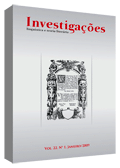Julius Heckethorn e Anton Webern: a presença do músico em 'Avalovara'
Abstract
Este ensaio traz uma refl exão sobre a formação da personagem Julius Heckethorn, protagonista do capítulo metalingüístico do romance Avalovara de Osman Lins, intitulado O relógio de Julius Heckethorn. A fim de iluminar a semelhança das estratégias utilizadas pelo escritor pernambucano com um caso clássico dos estudos da Melopoética – o romance Doutor Fausto, de Thomas Mann – comentaremos alguns aspectos dessa obra onde a música exerce um papel estruturalmente muito importante, sobretudo pela utilização da figura do músico na narrativa, como metáfora da presença do criador no texto.References
ANDRADE, Ana Luíza. 1987. Osman Lins: Crítica e Criação. São Paulo: HUCITEC.
CANDIDO, Antônio. et al. 1973. A personagem de ficção. 5. ed. São Paulo: Perspectiva.
DALCASTAGNÈ, Regina. 2000. A Garganta das Coisas: movimentos de Avalovara, de Osman Lins. Brasília: UNB; Imprensa Oficial.
FRANK, Joseph. 2003. A Forma Espacial na Literatura Moderna. Revista USP, São Paulo, n 58, p. 225-241, junho/agosto.
FERREIRA, Ermelinda Maria Araújo. 2005. Cabeças Compostas: a personagem Feminina na Narrativa de Osman Lins. 2. ed. São Paulo: Edusp.
GRIFFITHS, Paul. 1997. A Música Moderna. Rio de Janeiro: Jorge Zahar Editor.
LEAL, César. 2005. Thomas Mann: uma imagem do século XX, in: Dimensões Temporais na Poesia & outros Ensaios. Vol.I. Rio de Janeiro: Imago.
LESSING, Gotthold Ephraim. 1998. Laocoonte ou sobre as fronteiras da pintura e da poesia. São Paulo: Iluminuras.
LINS, Osman. Avalovara. 1975. 3 ed. São Paulo: Melhoramentos.
______.1974. Guerra sem testemunhas. 2. ed. São Paulo: Ática.
______.1976. A Rainha dos Cárceres da Grécia. São Paulo: Melhoramentos.
______.1976. Lima Barreto e o Espaço Romanesco. São Paulo: Ática.
______.1979. Evangelho na Taba: outros problemas inculturais brasileiros. São Paulo: Summus Editorial.
MANN, Thomas. 1984. Doutor Fausto. 2. ed. Rio de Janeiro: Nova Fronteira.
______.2001. A gênese do Doutor Fausto. São Paulo: Mandarim.
NEIGHBOUR, Oliver; GRIFFITHS, Paul; PERLE, George. 1990. Segunda escola de Viena. Porto Alegre: L & PM. (Série The New Grove).
OLIVEIRA, Solange Ribeiro de. 2002. Literatura e Música: Modulações pós– coloniais. São Paulo: Perspectiva.
PEREIRA, Lawrence Flores. 2001. Doutor Fausto: Adrian Leverkühn, a ordem e os conceitos de arte subjetiva e objetiva. Revista Letras de Hoje, Porto Alegre, v. 36, n. 1, p. 193-213, março.
RABASSA, Gregory. 1979. Osman Lins and Avalovara: The Shape and Shaping of the Novel. World Literature Today, [S.l.], v. 53, p. 30-35, winter.
WEBERN, Anton. 1984. O Caminho para a Nova Música. 2. ed. São Paulo: Novas Metas.
Downloads
Published
How to Cite
Issue
Section
License
Copyright (c) 2009 Arnoldo Guimarães de Almeida Neto

This work is licensed under a Creative Commons Attribution 4.0 International License.
Authors who publish with Revista Investigações agree to the following terms:
Authors retain copyright and grant the journal right of first publication with the work simultaneously licensed under the Creative Commons Attribution 4.0 International (CC BY 4.0) license that allows others to share the work with an acknowledgement of the work's authorship and initial publication in this journal.
Authors are able to enter into separate, additional contractual arrangements for the non-exclusive distribution of the journal's published version of the work (e.g., post it to an institutional repository or publish it in a book), with an acknowledgement of its initial publication in this journal.
You are free to:
Share — copy and redistribute the material in any medium or format for any purpose, even commercially.
Adapt — remix, transform, and build upon the material for any purpose, even commercially.
The licensor cannot revoke these freedoms as long as you follow the license terms.
Under the following terms:
Attribution — You must give appropriate credit , provide a link to the license, and indicate if changes were made . You may do so in any reasonable manner, but not in any way that suggests the licensor endorses you or your use.
No additional restrictions — You may not apply legal terms or technological measures that legally restrict others from doing anything the license permits.

